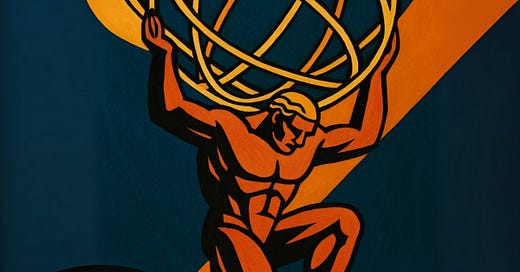The Fragile Fantasy of Elite Exit: Rand, Yarvin, and the Myth of Self-Sufficient Overlords
'We the people’ need to remind the elites that they rise and fall on our backs… and one day we may ‘shrug’.
When today’s technocratic libertarians talk about “going Galt” or replacing Congress with a CEO-king, they’re borrowing from two prophets of elite exceptionalism: Ayn Rand and Curtis Yarvin. Both writers center their history on a tiny brotherhood of superior minds, yet both gloss over the same fatal flaw: elites can only flourish atop a vast social infrastructure they neither built nor maintain.
Rand’s Capital-Strike Utopia
In Atlas Shrugged Rand stages the ultimate “capital strike.” Industrial titans, tired of regulation and altruistic guilt-trips, vanish into Galt’s Gulch, a hidden valley where they farm, fix generators, and flip each other’s burgers until the statist world collapses. Rand insists that because “wealth is a product of the mind,” the great minds can simply redirect their genius toward subsistence chores and keep their living standards intact.(atlassociety.org)
Critics have long pointed out that this fantasy collapses on contact with reality. Even a handful of CEOs-turned-farmers cannot smelt steel, refine silicon, run sewage lines, provide trauma surgery, or manufacture antibiotics without armies of specialized workers… much less would they want to clean their own toilets. Ayn Rand’s novel quietly assumes a level of technical and manual competence that its heroes—railroad moguls, copper barons, and socialites—simply do not possess. The result is a utopia that would starve or sicken within months if it really severed ties to the global supply chains and service labor it disdains. (thebaffler.com)
Yarvin’s CEO-Monarchy
Fast-forward to the Dark Enlightenment of software engineer-turned-political theorist Curtis Yarvin. Where Rand imagines an anarchic hideaway, Yarvin proposes a “neo-cameralist” state—a sovereign joint-stock corporation in which shareholders hire (and can fire) an all-powerful executive. Democracy, he argues, is obsolete code; society needs a “hard reset” under a single technocrat who can issue orders as cleanly as a database write.(en.wikipedia.org, resetdoc.org)
Yet Yarvin’s blueprint quietly relies on the same invisible scaffolding as Rand’s. A monarch-CEO can decree efficiency, but container ships still need stevedores, data centers need janitors, and hospitals need night-shift nurses. His governance model specifies who rules and how, but says almost nothing about why the ruled would continue to cook, weld, and care for the rulers once stripped of political voice. Like Rand, he presumes that if the brain trust seizes the helm, the engine room will keep shoveling coal.
The Logistics Problem Neither Theory Can Solve
Both thinkers share three assumptions that buckle under scrutiny:
Hidden Fallacies
Elites possess a full stack of skills. Most billionaires cannot repair elevators, grow staple crops at scale, or operate water-treatment plants.
Material abundance flows automatically from intelligence. Supply chains depend on thousands of interlocking, mostly blue-collar competencies. Genius does not weld pipelines.
The non-elite will accept permanent subordination. History shows that when labor withdraws—or revolts—elite lifestyles crumble far faster than governments do.
The irony is that real-world “capital strikes” already happen—investors move money offshore, tech founders threaten to relocate—but only within the elaborate market states they claim to loathe. Even titans who “go Galt” in protest tax exile still rely on FedEx, avionics engineers, and municipal water boards.(thebaffler.com)
Why Numbers Still Matter
Rand and Yarvin offer seductive myths for people who imagine themselves in the top 0.1 percent: a world where moral worth and market power are identical, where the rest of us are ballast.
But civilization is not a luxury good that elites can pack in their carry-on. It is a layered pyramid of human effort, and the broad base can choose—through strikes, unions, votes, or boycotts—to remind the apex who really keeps the lights on.
The takeaway is simple: the “great men” of finance and code only reign as long as the many are willing to grow their food, assemble their iPhones, and buy their IPOs. When the masses act together, Atlas doesn’t shrug. He just remembers he’s been standing on someone else’s shoulders all along.
We ‘the people’ need to remind the elites that they rise and fall on our backs… and one day we may ‘shrug’.




